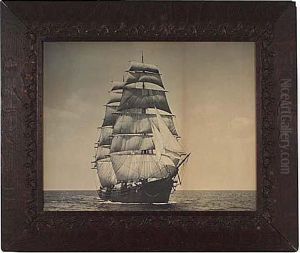Charles E. Bolles Paintings
Charles E. Bolles, more famously known as Black Bart, was not a traditional artist in the sense of painting, sculpture, or literary works; instead, his infamy and legend are woven into the fabric of American Wild West folklore. Born in 1829 in Norfolk, England, Bolles would emigrate to the United States as a young man, eventually leaving an indelible mark on American history not through conventional artistry but through his notorious career as a stagecoach robber. Despite his criminal endeavors, the persona of Black Bart and the tales surrounding him have become a part of the cultural heritage, illustrating the blurred lines between reality and mythology in the narrative of the American frontier.
Bolles ventured to California in 1849 during the height of the Gold Rush, initially trying his hand at mining. However, it was his turn to stagecoach robbery that etched his name in history. Between 1875 and 1883, Black Bart was credited with at least 28 robberies of Wells Fargo stagecoaches across California and Oregon, earning a reputation for his distinctive modus operandi. Notably, he committed his robberies without firing a shot, relying instead on intimidation and his wits. He famously left behind verse at several crime scenes, signed under the pseudonym 'Black Bart,' which contributed to his mythic status. These poems, often taunting authorities and celebrating his exploits, were among the few tangible outputs of his creative endeavors, showcasing a flair for theatrics and a keen understanding of his persona's impact on the public imagination.
Despite his criminal activities, Black Bart was described by contemporaries as a gentleman bandit, avoiding violence and often charming those he robbed. His capture in 1883 marked the end of his criminal career but the beginning of his legacy as a folk hero. After serving four years in San Quentin State Prison, he was released, and his subsequent whereabouts and activities became the stuff of speculation and mystery, further fueling his legend.
Bolles' death in 1888 did little to diminish the fascination with his life and exploits. Over the years, Black Bart has been immortalized in various forms of media, including literature, film, and music, underscoring his transformation from a real-life outlaw to a cultural icon. While not an artist in the traditional sense, the legacy of Charles E. Bolles as Black Bart is a testament to the power of narrative, personality, and myth in shaping historical and cultural memory. His life story, intertwined with the development of the American West, remains a captivating chapter in the broader tapestry of American folklore and history.





